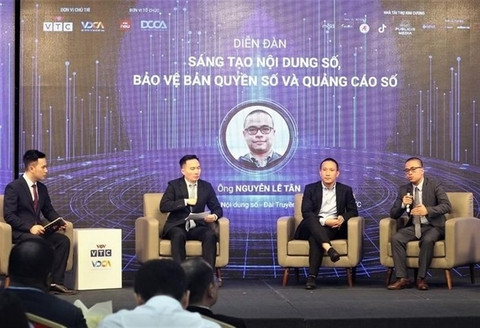
VTC in collaboration with VDCA organise the forum on digital content creation, digital copyright protection and digital advertising. — Photo plo.vn
In the current development of technology and the internet, digital content creation is considered a potential new land.
However, enterprises operating in this field face many obstacles and inadequacies, requiring new methods and appropriate behaviour from businesses and State management agencies.
The information was given by the speakers at the forum on digital content creation, digital copyright protection and digital advertising organised by VTC Digital Television in collaboration with Viet Nam Digital Communications Association (VDCA) in Ha Noi this week.
Tran Duc Thanh, VTC director, said that in the context that the fourth industrial revolution was taking place very quickly, with far-reaching and multi-dimensional impacts on a global scale, innovation and digital content creation and implementation of digital transformation activities had become increasingly decisive factors for the competitiveness of each unit, organisation and individual.
Sharing the same view, Vu Kiem Van, vice president and general secretary of VDCA, said that digital content creation, digital copyright protection and digital advertising were key factors, closely related to one another in the digital content industry.
The popularity of the internet and the emergence and strong development of digital platforms had changed the habits and behaviour of audiences when accessing and enjoying content from traditional forms such as television, radio, and newspapers to the digital space, he said.
To catch up with this trend, content producers are forced to change their thinking to create diverse digital content products in many fields from news, entertainment, to sports, and education to suit the tastes of customers as well as the digital space and digital devices.
Since then, digital content creation has become a potential new land for content producers and brands and digital advertising businesses.
Inadequacies
However, the Vice President of VDCA acknowledged that, in that development flow, activities in the field of digital content often faced problems and inadequacies that were unprecedented in Viet Nam, even on a global scale, especially the protection of digital content copyright and digital advertising business.
Therefore, practice always requires new methods in the operation and management of State management agencies, content production enterprises, advertising enterprises as well as end users in order to make appropriate adjustments.
Hoang Dinh Chung, director of VDCA's Digital Copyright Centre said that in the digital environment, copyright violators had used technology to infringe copyright.
Accordingly, content copyright owners in the digital environment must be associated with technological factors to have enough measures to prevent copyright infringement.
Secondly, in the digital environment there were a large number of content products, he noted.
Therefore, using manual measures was very difficult both in registering for protection and in scanning whether there was an infringement or piracy of content in the digital environment, said Chung.
The third difficulty was the issue of electronic evidence, which was costly in terms of time and resources, making digital content owners afraid of detecting violations and proving whether or not the object is piracy, he added.
Thus, the law should consider the recognition of electronic evidence in copyright infringement in the digital environment, he noted.
From a business perspective, Ta Minh Hoang, general director of Sconnect Viet Nam, said that copyright issues, understanding of intellectual property and handling method was the problem of each enterprise for sustainable development.
Meanwhile, Vietnamese enterprises had not paid much attention to copyright and intellectual property, which has led to conflicting activities from strong competitors.
Due to the lack of knowledge about intellectual property issues, many businesses were confused, in addition to having no resources to participate in resolving disputes and complaints about copyright infringement, he added.
Hoang recommended enterprises study and apply successful development models of foreign enterprises; and strengthen exchanges and cooperation with domestic and international businesses in the same field.
He also recommended enterprises attend international exhibitions and fairs, approach and learn modern management models and new technologies; and share problems and difficulties as a basis to create connections with State management agencies. — VNS